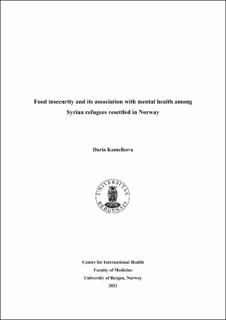| dc.description.abstract | Background: Refugees are more exposed to food insecurity than the general population. Simultaneously, prevalence rates of anxiety and depression are higher among refugees compared to the general population in receiving countries. This study aims to describe food insecurity and to study the association between food insecurity and mental health among Syrian refugees resettled in Norway. Methods: As part of the CHART study (Changing Health and health care needs Along the Syrian Refugees’ Trajectories to Norway), 352 Syrian refugees settled in Norway for approximately one year participated in a structured telephone survey. We assessed food insecurity with the Household Food Security Survey Module (HFSSM) and mental health (symptoms of anxiety and depression) with a short version of the Hopkins symptom checklist (HSCL-10). We used descriptive statistics to present food insecurity overall, and among women, men, and children separately. The association between food insecurity and mental health symptoms was studied using logistic regression. Results: Among Syrian refugees resettled in Norway for one year, 28% of adults and 16% of children were food insecure. The following food insecurity parameters expressed as odds ratios with 95% confidence intervals (OR; 95% CI) were significantly associated with adult mental health: “Not enough food” (3.6; 1.9-6.7), “Worried that food will not last” (3.8; 2.1-6.7), “Food does not last” (4.9; 2.7-8.8), “Not eating balanced food” (5.2; 2.7-10.0), “Skipping meals” (3.9; 2.0-7.4), “Eating less” (7.6; 3.6-16.1), “Being hungry” (6.6; 2.7-15.9), “Losing weight” (4.9; 1.9-12.7), “Not eating for a whole day” (3.4; 1.1-10.4), “Low food diversity for children” (3.7; 1.9-7.3), “Children do not eat balanced food” (3.7; 1.6-8.5), “Cutting size of portion for children” (3.2; 1.4-7.5), “Children do not eat enough” (2.3; 1.0-5.3). Conclusion: Food security is a human right. Food insecurity and its association to mental health should be better understood and targeted among Syrian refugees and their children living in Norway. | |
